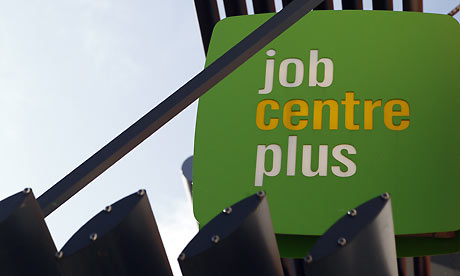• Claimant count rise confounds forecasts
• Jobless total falls 8,000 to 2.467m
• But 286,000 people secured jobs in three months to July
• Part-time workers now account for 27% of workforce
• But 286,000 people secured jobs in three months to July
• Part-time workers now account for 27% of workforce

Phillip Inman
The number of people claiming unemployment benefits jumped unexpectedly last month, fuelling concern that the government's austerity budget in June undermined business confidence and pushed the economy into reverse.
The claimant count rose by 2,300 in August to 1.47m, according to the Office for National Statistics, confounding City expectations that a downward trend started in January would continue throughout the summer.
The broader International Labour Organisation measure of the number of people without a job registered a fall, but the decrease of 8,000, to 2.467m was also below City forecasts. Analysts had been expecting a decline of around 35,000.
In a poor month for economic data, the unemployment figures follow the highest balance of trade deficit on record last week and surveys of the services and construction sectors showing employer sentiment deteriorating sharply.
The International Monetary Fund said this week it was worried by rising unemployment in western countries and urged governments to consider measures to boost employment. The OECD, the Paris-based rich nations thinktank, revised down its most recent growth forecasts and warned of the need for governments to stimulate growth.
Unions said the unemployment figures highlighted their concerns that the economy had gone into reverse over recent months and public spending cuts due in the comprehensive spending review would make the situation worse.
Brendan Barber, TUC general secretary, said: "The worry must be that we are at a turning point as spending cuts hit business and consumer confidence."
"What is clear is that the economy is still extremely fragile. With more than one in six young people without work, the best the government can expect is a largely jobless recovery. At worst the economy could go into reverse, as the OECD now recognises."
There was some positive news. The number of people in employment in the three months to July registered its largest rise since records began, with 286,000 more people securing jobs. However, economists pointed out the figure was boosted by 166,000 part-time jobs, continuing a trend during the year for employers increasingly to rely on part-time workers. The employment figures also lag behind the claimant count data, which gives a more recent signal of labour market trends.
Howard Archer at IHS Global Insight said the data was "both disappointing and worrying" fuelling fears that the improvement in the labour market is coming to an end, "even before public sector job cutting really gets under way".
Chris Williamson, chief economist at Markit, said the labour market was "showing signs of weakening" which can be "largely explained by the fact that the increase in employment was driven by part-time workers" Alan Clarke, UK economist at BNP Pariibas said the increase in employment wopuld represent a peak.
"The worsening in unemployment is consistent with what we know is happening to growth. Hence we very much doubt the buoyancy of the employment data will last much longer.
Archer added the jump in part-time employment indicated that many companies are reluctant to add full-time workers amid serious concerns over the sustainability and longer-term strength of the recovery. Part-time workers now account for 27.2% of total employment, up from 25.4% at mid-2008.
Employers groups said the government needed to move quickly to boost job growth with investment in infrastructure and other major projects.
Unions said the figures showed the economy remained fragile and in need of government support.
Employment minister Chris Grayling stressed that full-time and part-time jobs were being created at record levels, which supported the government's view that the economy was robust. He said he was disappointed the number of people claiming unemployment benefits had remained stubbornly high, justifying further action to get welfare claimants back into work.
No comments:
Post a Comment